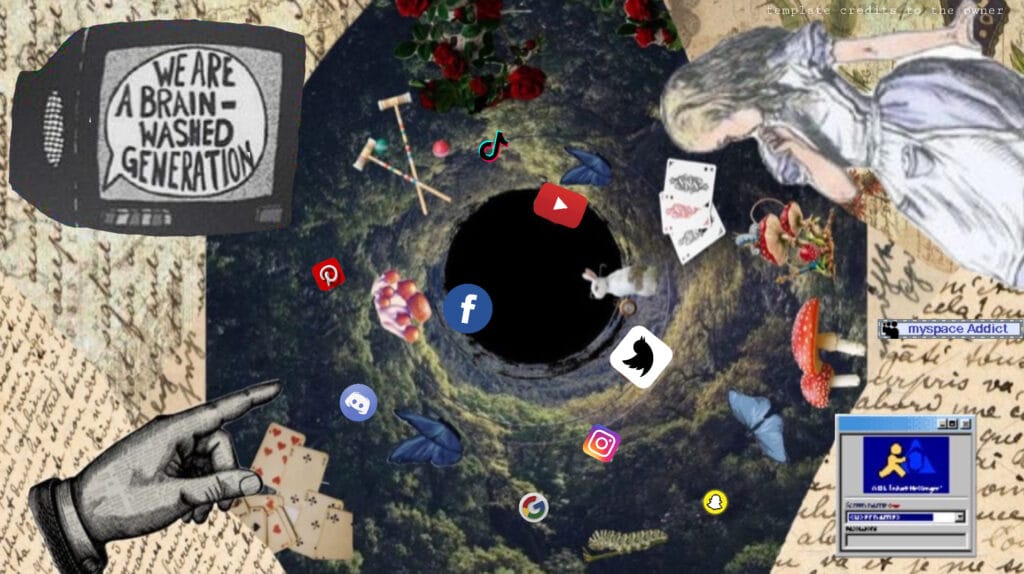Remember the days of chat rooms back in the early 2000s? Those digital spaces where you could log in into a room named “Music Lovers” or “Bookworms Unite” and strike up a conversation with a bunch of strangers who shared your quirks and interests? Fast forward to today, and social media has transformed those snug crowded chat rooms into a digital metropolis of likes, comments, and shares. But let’s be real, has this evolution truly been an upgrade, or did we lose something priceless along the way?
When the world was younger with the Internet, chat rooms were like digital hangouts where people gathered to discuss everything from the latest TV shows to their favorite bands, to share stories, secrets, and maybe even a bit of harmless flirting. No algorithms fine-tuning your feed, no targeted ads stalking your every move. It was just you, your screen name (remember how much effort you put into picking out something cool), and a bunch of other people who were just as curious about you as you were about them. The conversations were pure and unfiltered. You’d enter a room, say hello, and just see where the chat took you. People were there to talk, connect, and share. No pressure to present a polished version of yourself. If someone asked what you looked like, you’d awkwardly describe yourself or share a grainy photo if you were feeling brave.
The magic of chat rooms was in the depth of the conversations. Without the distractions of memes, videos, and clickbait articles, people talked. They asked questions, shared stories, and formed connections that, believe it or not, sometimes turned into real-life friendships. You weren’t just a follower or a friend request; you were a person with thoughts, feelings, and a story to tell.
Then came social media, promising to make our lives easier, our connections stronger, and our world smaller. At first, it seemed like a dream come true. You could keep up with your friends, share photos, and even poke people (thanks, Facebook). But as social media grew, so did the problems. Social media gave us the illusion of being more connected than ever. With hundreds of friends and followers, you’d think we’d feel more socially satisfied. Yet, the opposite happened. Instead of deep, meaningful conversations, we got status updates and filtered photos. Instead of spontaneous chats, we got scheduled posts and strategic likes.
Popularly most used social media apps like Snapchat and Instagram turned our lives into a never-ending performance. We started editing our photos and crafting our online personas. The pressure to present a perfect life led to stress, anxiety, and a whole lot of FOMO. Instead of being ourselves, we became our profiles. Cutting to the chase, it’s exhausting trying to keep up with the Joneses when the Joneses have 10,000 followers and a life that looks like it was scripted by a film director.
It’s not all bad, but let’s be real: it’s not all good either. It’s changed the way we interact, and not always for the better. Remember when you could look someone in the eye and understand how they felt? That’s harder to do through a screen. Without facial expressions, body language, and tone of voice, empathy gets lost in translation. We judge people based on their comments, likes, and shares, without understanding the person behind the profile. The constant barrage of information and the pressure to keep up can be overwhelming. Studies have shown that heavy social media use is linked to increased rates of depression, anxiety, and loneliness. We’re more connected than ever, yet we feel more alone. It’s a paradox that’s hard to ignore.
With raising superficial relationships where the number of friends, followers, or likes takes over the quality of interactions, we’ve traded meaningful engagement for fleeting validation. When was the last time you had those late-night chats with your friends at a sleepover where you’d talk about everything and nothing until the sun came up? Now, it’s all about quick comments in the group chat and scrolling through reels. The depth has been replaced by a shallow sea of emojis, stickers, and hashtags.
Imagine if we could go back to the days of chat rooms. What would our social lives look like? Instead of amassing hundreds of friends, we’d focus on a few meaningful relationships. We’d have deep conversations that matter, rather than scrolling through endless feeds of superficial updates. We’d prioritize face-to-face interactions. Meeting up for coffee, having dinner with friends, or just taking a walk and talking about life would become the norm again. We’d remember what it feels like to be present with someone.
So, start by setting boundaries for your social media use. Designate specific times for checking your feeds and stick to them. Use apps that track and limit your screen time to help you stay accountable. Make an effort to engage in real-life activities. Join clubs, volunteer at NGOs, attend events, or simply spend time with friends and family without the distraction of your phone. Plan regular meet-ups and make them a priority. When you’re with others, be fully present. Put your phone away, make eye contact, and listen actively. Show genuine interest in what others are saying and share your own thoughts and feelings openly. By reconnecting in person, we’d regain our ability to empathize. Seeing someone’s smile, hearing their laughter, or feeling their hug would remind us of the power of human connection. We’d start to understand each other better and judge each other less. Believe it or not, playing games can help rebuild those lost connections. Incorporate social games into your gatherings. Whether it’s a game night with friends or a family get-together, social games can break the ice and encourage meaningful interactions. Social games that require teamwork, communication, and empathy can teach us valuable skills. For example, games like Among Us, Charades, Pictionary, Keep Talking and Nobody Explodes or other board games. Learn to make a conscious effort to understand others’ perspectives. Take the time to ask questions and listen without judgment. Recognize that everyone has a story and that social media often only shows a fraction of it. While we can’t turn back time, we can take steps to reclaim the genuine connections we once had.


